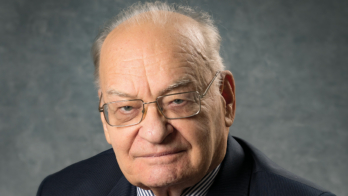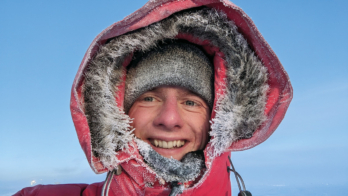
Valery Rubakov, who pioneered groundbreaking ideas and methods in many domains of particle physics and cosmology, passed away suddenly on 19 October at the age of 67.
Born in Moscow in 1955, Valery studied physics at Moscow State University from 1972–1978. He started doing research in his third year of studies, publishing his first paper at the age of 21 on the topic of quantum gravity. Valery joined the Institute for Nuclear Research (INR) of the Russian Academy of Sciences in 1978, defending his PhD on the non-perturbative aspects of gauge theories in 1981. At the age of 26, Rubakov had already made his name in global high-energy physics. He discovered that the ’t Hooft–Polyakov super-heavy magnetic monopoles that exist in grand-unified theories “catalyse” proton decay – a beautiful and subtle non-perturbative effect that provides alternative experimental signatures in the search of monopoles.
Valery was one of the first physicists to realise the importance of inflationary theory, his 1982 work with Mikhail Sazhin and Alexey Veryaskin on the primordial production of gravitational waves establishing important constraints on the energy scale of the de-Sitter stage of inflation. In 1983 Rubakov (together with Mikhail Shaposhnikov) proposed alternatives to Kaluza–Klein compactification in theories with more than four space–time dimensions – one of which is now known as the brane-world scenario, where the particles of our world live on a four-dimensional defect embedded in a higher-dimensional universe.
He produced key contributions towards the understanding of the baryon asymmetry of the universe. His paper in 1985 with Vadim Kuzmin and Shaposhnikov revealed that non-perturbative processes can drive a rapid violation of baryon- and lepton-number conservation in the early universe – the basic ingredient of thermal leptogenesis. In 1998, together with Evgeny Akhmedov and Alexey Smirnov, he suggested how to produce the baryon asymmetry by relatively light right-handed neutrinos – an alternative to so-called Fukigita–Yanagida leptogenesis, which opened a unique possibility for experimental verification.
In a series of remarkable articles from 1987–1988, Valery, together with his PhD students George Lavrelashvili and Peter Tinyakov, discussed the physical impact of topology change in quantum gravity, analysing deep conceptual issues such as quantum coherence. In 1990–1991, together with Sergei Khlebnikov and Peter Tinyakov, he attacked the challenging problem of how to compute the probability of anomalous processes with baryon number non-conservation in very high-energy collisions above tens of TeV. He returned to this problem together with Fedor Bezrukov, Dmitry Levkov and Claudio Rebbi, in 2003, demonstrating that these reactions are exponentially suppressed, thus removing hopes of experimental verification of this phenomenon.
Valery made imprints in virtually all areas of particle physics and cosmology: supersymmetry phenomenology; the strong CP-problem; dark matter and dark energy; non-commutative field theories; classical and quantum gravity; and alternatives to inflation, to name a few. His very last article, written with Christof Wetterich, was devoted to a physical concept of time for the beginning stage of the universe.
Valery was also an outstanding and passionate teacher, creating the “Rubakov School” of theoretical physics and cosmology in Moscow, and a successful scientific manager. As a research director of INR from 1987 to 1994, for example, he was responsible for the construction and operation of the Baksan neutrino observatory and the Baikal deep underwater neutrino telescope. Valery was a member of the CERN Scientific Policy Committee from 2014 to 2019 and served on the ICTP Scientific Council from 2010 to 2020. He was the recipient of numerous prizes, awards and distinctions and wrote several excellent textbooks, including Classical Theory of Gauge Fields (Princeton 2002).
Valery Rubakov was an exceptional person. He defended scientific thinking, the freedom of mind and fruitful collaboration between scientists from different countries. He will always be remembered for his kindness, sharp and inventive mind, charisma, honesty and integrity.





